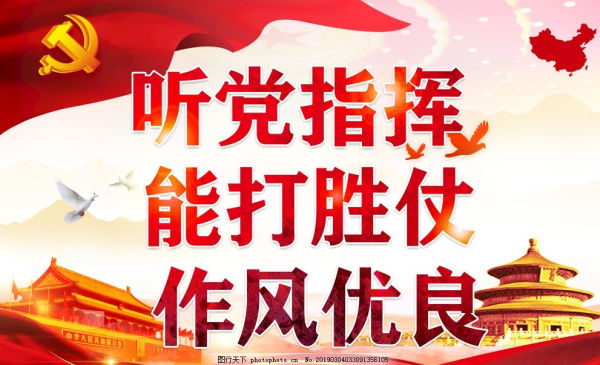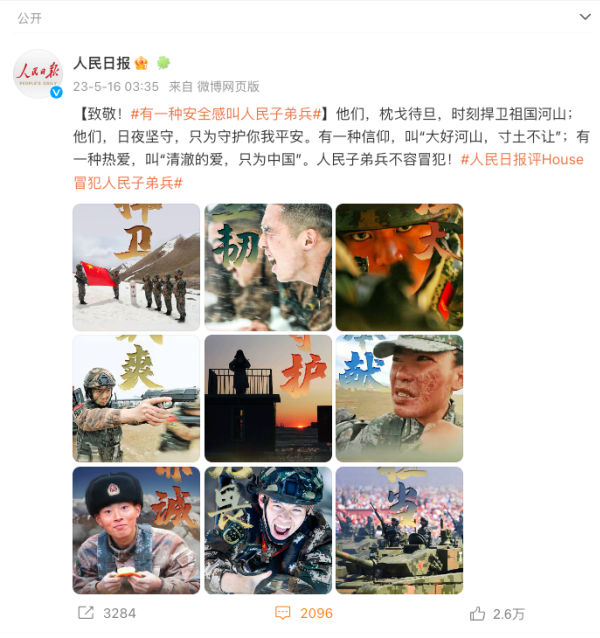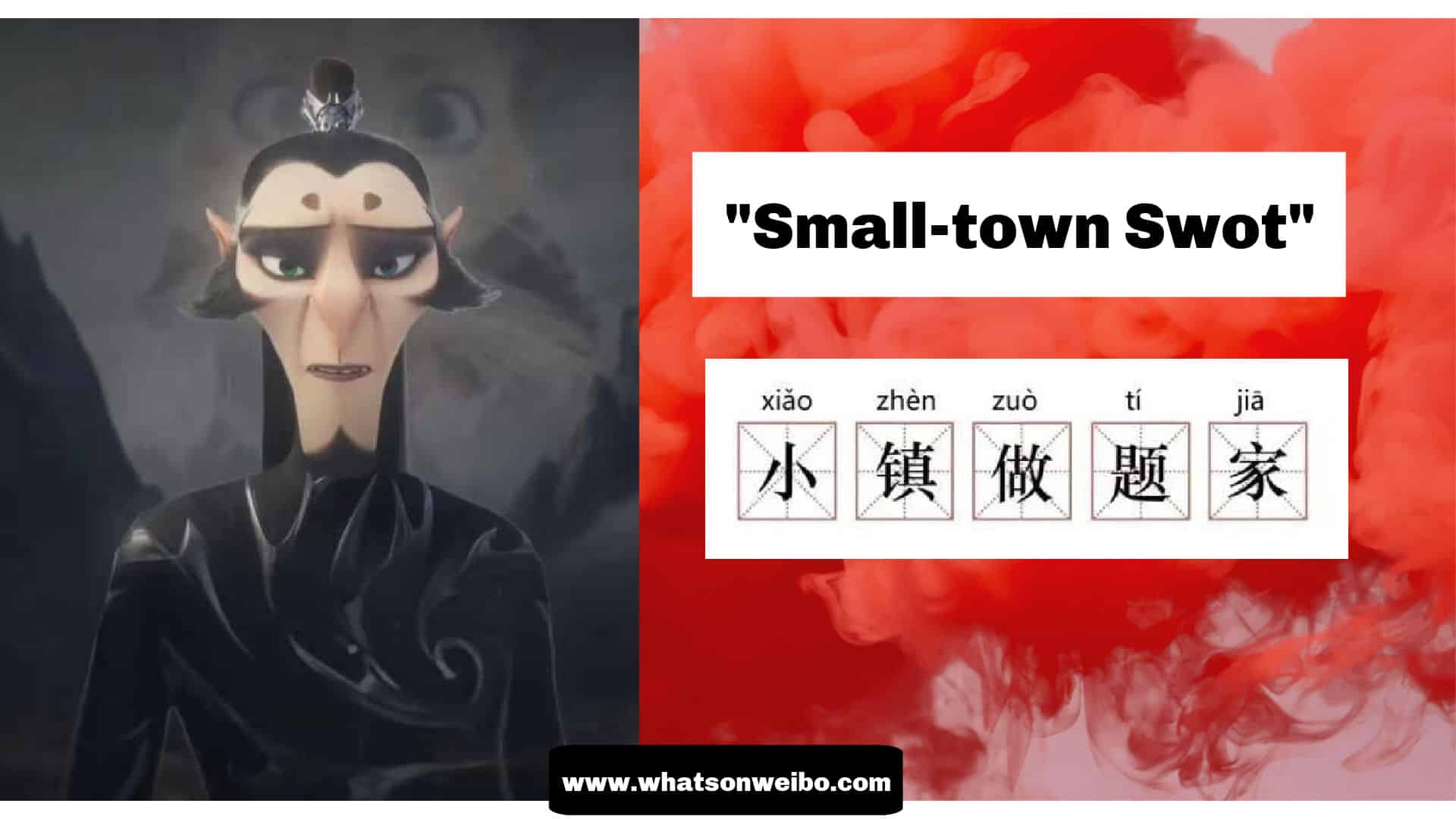China Arts & Entertainment
A Joke Too Far: 3 Social Media Views on Chinese Comedian Li Haoshi Getting Canceled over PLA Pun
From Weibo to WeChat, from Douyin to Zhihu, Li Haoshi’s joke has sparked widespread conversations, and opinions vary.
Published
2 years agoon

There is a delicate balance between humor and controversy, and Chinese comedian Li Haoshi recently discovered the consequences of crossing that line. In a punchline that took aim at China’s People’s Liberation Army, Li found himself at the center of a significant controversy. Is Li deserving of his ensuing cancellation? On Chinese social media, opinions are divided.
A Chinese comedian’s politically incorrect joke is the topic that everyone has been talking about this week, even making international headlines.
Li Haoshi (李昊石), a comedian who performed under the stage name ‘House’ with the famous Chinese comedy company Xiao Guo company (笑果文化), recently faced accusations of making offensive remarks towards the Chinese army during one of his shows. As a result, he has been subjected to a ban on social media platforms and has also been prohibited from participating in future performances.
The show in question took place on May 13th and while the performance officially was not allowed to be filmed, some attendees recorded the particular joke that caused controversy and then exposed House on social media. According to a Zhihu user who claimed to have secretly recorded the entire show, the joke went as follows:
“Shanghai is an international metropolis where everything is aligned with international standards. After I moved to Shanghai, I adopted two stray dogs. Strictly speaking, they weren’t stray dogs. We found them on a nearby mountain, and they were wild dogs. We can’t really say we rescued them because they were at the top of the food chain in the mountains and didn’t need our help. We were more like a makeover show, experiencing city life. These two dogs were indeed the top predators on the mountain. When I first saw them, it felt like I was witnessing a wildlife documentary. The two dogs would chase a squirrel like a missile launched into the air. Normally, when you see dogs, you find them cute, and your heart melts. You think of these words. But when I saw these two dogs, only eight words flashed in my mind: ‘Good discipline, capable of winning battles’ (作风优良, 能打胜仗). They were truly exceptional. I walked proudly on the streets of Shanghai with these two dogs. The only problem was that they had so much energy. My physical fitness couldn’t keep up.”
The triggering aspect of this joke lies in the eight words “zuò fēng yōu liáng, néng dǎ shèng zhàng” (“作风优良, 能打胜仗”: “Good discipline, capable of winning battles”). This slogan has long been associated with the Chinese People’s Liberation Army (中国人民解放军, PLA) as a standard used to describe and motivate the army. The lines, used by Xi Jinping in 2013, are used together with another phrase, namely that of “tīng dǎng zhǐhuī” (“听党指挥”), meaning “to obey the Party’s command” or “follow the Party’s leadership,” together encapsulating the principles of the Chinese military.

“Obeying the Party’s command – Capable of winning battles – positive work ethic” – these famous phrases were used in a comical context by Chinese comedian House. (Image source).
Using the army’s slogan to describe two wild dogs is considered offensive to the PLA’s “sacred and inviolable” image.
The joke was considered such a serious faux pas that Party newspaper People’s Daily posted about it on social media platform Weibo two days later, claiming that performers in talkshows should be cautious with their words and be careful to stay within appropriate boundaries.
They also suggested that there should be consensus within the industry on where the bottom line is on which jokes can and cannot be made. People’s Daily used the phrase “tuōkǒu mò tuōguǐ, wán gěng xū yǒu dù” (“脱口莫脱轨,玩梗须有度”), which can be translated as: “Do not deviate when speaking freely, and use jokes [memes/punch lines] with moderation.”
The word used for ‘talkshow’ is tuōkǒuxiù 脱口秀, a Chinese term that literally translates to “talk show” but actually mostly refers to stand-up comedy shows and a type of popular form of entertainment in which performers showcase their humorous storytelling skills in an engaging and often improvisational manner.
Li Haosi’s controversial joke garnered more significant attention from Chinese state media. After People’s Daily initial post, they made another Weibo post addressing the issue. The post began with the hashtag “There is a sense of security called the soldier sons of the people” (#有一种安全感叫人民子弟兵#), which is a widely used phrase to describe the People’s Liberation Army (PLA) and highlight the close relationship between the military and the Chinese people.

A second post by People’s Daily about the Li Haoshi controversy paid tribute to China’s PLA soldiers.
In the post, People’s Daily expressed their support for the PLA and condemned any action or statement that might be seen as disrespectful or offensive towards the military and the soldiers who serve as the guardians of the Chinese people (“人民子弟兵不容冒犯”). They tagged their post with the hashtag “People’s Daily Discusses ‘House’ Offending the Soldiers Sons of the People” (#人民日报评House冒犯人民子弟兵#), which has since received over 670 million views on Weibo.
As the controversy surrounding Li Haoshi escalated, fuelled in part by Chinese state media, it has also became a prominent topic of discussion among the general social media userbase. From Weibo to WeChat, from Douyin to Zhihu, Li Haoshi’s joke has sparked widespread conversations. Within these online discussions, there are three prominent and recurring viewpoints that we will explore here.
1: TOLERANCE & MORE FREEDOM OF SPEECH
“You ‘wolf warriors’ and ‘little pinkies’ are only good at conducting witch hunts! It is actually you who should be canceled.”
The notion of talk shows being regarded as “an art of offense” (“一种冒犯的艺术”) is widely discussed on Chinese social media these days. Evaluating the boundaries between ‘acceptable humor’ and ‘crossing the boundaries’ continues to be a topic of discussion, with some advocating for performers’ artistic freedom of expression and speech, arguing that “there is no offensive art, but all kinds of genuine art can be offensive.”
In a since-deleted WeChat article, one Chinese blogging account expressed readers’ concerns regarding the Li Haoshi controversy. A major concern raised was not just about freedom of expression for performers, but about freedom of expression within this topic itself, suggesting that the online discourse surrounding the ‘House controversy’ allows very limited space for actual debate and offers no opportunity for people to discuss the different perspectives of the story.
On Weibo, some individuals express similar concerns about the lack of nuance in the discussion. Apart from censorship or top-down control, they worry about a general discussion environment that leaves no space for opposing opinions. One person commented: “You ‘wolf warriors’ and ‘little pinkies’ are only good at conducting witch hunts! It is actually you who should be canceled.”
“The more people comment, the more extreme they get,” another person wrote. Meanwhile, the comment sections of various popular posts discussing the issue were either disabled or heavily filtered, to the extent that none of the 244 listed comments were visible.
2: CROSSING A RED LINE
“It is very simple. Making jokes is not the same as malicious slander.”
Many people do not agree with those advocating for a more tolerant approach to the Li Haoshi controversy. A seeming majority of Weibo users argue that ‘talk shows’ should not serve as a sanctuary for “inappropriate speech.” They assert that public speeches have inherent “bottom lines” that cannot be crossed. Performers should be aware of these existing red lines, and should not use their profession as an excuse to express problematic statements.
One popular blogger (@胜利主义章北海) argued that comedians are already well aware that they have certain boundaries; offending their audience would rob them of their income, and they are also careful not to insult their boss or colleagues: “They would not dare to [offend them]. They are conscious of these boundaries. So why would they dare to offend the PLA?”
Many agree with this stance: “It is very simple. Making jokes is not the same as malicious slander.”
In these online discussions, the United States is often cited as an example due to its strong emphasis on free speech. Some Chinese netizens note that even in the U.S. and other Western countries, there are also topics or jokes that would be considered off-limits and could lead to consequences such as being canceled.
The Weibo account “Xu Ji Observation” (@徐记观察, previously recognized for positive online content and the promotion of the “mass line”) mentions how some people in America were condemned for even hinting at disrespecting the military. American quarterback Tom Brady was widely criticized in 2021 after comparing playing football to military deployment, and Pete Davidson was slammed for making fun of an American representative and war veteran who had lost one eye during his deployment in Afghanistan. Both Brady and Davidson had to apologize.
Although many people agree with Xu Ji’s observation, others argue that the comparison is not entirely fair, as the consequences faced by Chinese performers who get ‘canceled’ go beyond a simple apology. In China, as exemplified by Li Haoshi’s current situation, an apology alone is unlikely to resolve the matter (read more about China’s canceled celebrities here).
3: ALWAYS HONOR OUR SOLDIERS
“”We can do without talk show hosts or celebrities, but we cannot do without our soldier sons of the people!”
There is also a large group of netizens who argue that this discussion should not be about ‘freedom’ versus ‘boundaries’ at all, but instead should focus on the mere fact that the Chinese comedian deliberately insulted the “soldier sons of the people,” and in doing so, committing a crime according to the “Heroes and Martyrs Protection Law.”
Although Chinese state media have led narratives surrounding this controversy in which they stress the ‘sacredness’ of the PLA, its mission, and duties, there are many netizens who say they feel the same. House’s joke has triggered anger among Chinese social media users who emphasize the dedication of the PLA and condemn any jokes targeting them.
In many online posts, bloggers highlight the heroic actions of the PLA in the past and, using patriotic images of soldiers with national flags, remind people about how they selflessly rescued people during the Wenchuan Earthquake or persistently guarded the South China Sea.
One popular comment said: “We can do without talk show hosts or celebrities, but we cannot do without our soldier sons of the people!”
While online discussions surrounding the Li Haoshi controversy are ongoing, Chinese authorities have concluded that the joke constitutes a legal violation. As of May 18th, House’s social media account has been suspended, he has been boycotted by the China Association of Performing Arts, and the Beijing Police have announced their intention to investigate the case due to House’s alleged “severe insult to the People’s Liberation Army during his performance, causing a highly negative societal impact.”
Furthermore, Xiao Guo, the company representing House, has received an official warning and has had over 1.35 million yuan ($190,000) in “illegal gains” confiscated, along with a fine of 13.35 million yuan ($1.8 million) imposed by the police. In response to this penalty, the company has canceled all scheduled performances in China and terminated their contract with Li Haoshi.
Read more related articles:
◼︎ “Love the Motherland” – New Moral Guidelines for Chinese Performers Come Into Force
◼︎ Chinese Comedian Li Dan under Fire for Promoting Lingerie Brand with Sexist Slogan
◼︎ Female Comedian Yang Li and the Intel Controversy
◼︎ 25 ‘Tainted Celebrities’: What Happens When Chinese Entertainers Get Canceled?
By Zilan Qian and Manya Koetse, with contributions by Miranda Barnes
Get the story behind the hashtag. Subscribe to What’s on Weibo here to receive our newsletter and get access to our latest articles:
Spotted a mistake or want to add something? Please let us know in comments below or email us. First-time commenters, please be patient – we will have to manually approve your comment before it appears.
©2023 Whatsonweibo. All rights reserved. Do not reproduce our content without permission – you can contact us at info@whatsonweibo.com.
Stories that are authored by the What's on Weibo Team are the stories that multiple authors contributed to. Please check the names at the end of the articles to see who the authors are.

China Arts & Entertainment
How K-pop Fans and the 13-Year-Old Daughter of Baidu VP Sparked a Debate on Online Privacy
What began as K-pop fan outrage targeting a snarky commenter quickly escalated into a Baidu-linked scandal and a broader conversation about data privacy on Chinese social media.
Published
3 weeks agoon
March 26, 2025By
Ruixin Zhang
For an ordinary person with just a few followers, a Weibo account can sometimes be like a refuge from real life—almost like a private space on a public platform—where, along with millions of others, they can express dissatisfaction about daily annoyances or vent frustration about personal life situations.
But over recent years, even the most ordinary social media users could become victims of “opening the box” (开盒 kāihé)—the Chinese internet term for doxxing, meaning the deliberate leaking of personal information to expose or harass someone online.
A K-pop Fan-Led Online Witch Hunt
On March 12, a Chinese social media account focusing on K-pop content, Yuanqi Taopu Xuanshou (@元气桃浦选手), posted about Jang Wonyoung, a popular member of the Korean girl group IVE. As the South Korean singer and model attended Paris Fashion Week and then flew back the same day, the account suggested she was on a “crazy schedule.”
In the comment section, one female Weibo user nicknamed “Charihe” replied:
💬 “It’s a 12-hour flight and it’s not like she’s flying the plane herself. Isn’t sleeping in business class considered resting? Who says she can’t rest? What are you actually talking about by calling this a ‘crazy schedule’..”

Although the comment may have come across as a bit snarky, it was generally lighthearted and harmless. Yet unexpectedly, it brought disaster upon her.
That very evening, the woman nicknamed Charihe was bombarded with direct messages filled with insults from fans of Jang Wonyoung and IVE.
Ironically, Charihe’s profile showed she was anything but a hater of the pop star—her Weibo page included multiple posts praising Wonyoung’s beauty and charm. But that context was ignored by overzealous fans, who combed through her social media accounts looking for other posts to criticize, framing her as a terrible person.
After discovering through Charihe’s account that she was pregnant, Jang Wonyoung’s fans escalated their attacks by targeting her unborn child with insults.
The harassment did not stop there. Around midnight, fans doxxed Charihe, exposing her personal information, workplace, and the contact details of her family and friends. Her friends were flooded with messages, and some were even targeted at their workplaces.
Then, they tracked down Charihe’s husband’s WeChat account, sent him screenshots of her posts, and encouraged him to “physically punish” her.
The extremity of the online harassment finally drew backlash from netizens, who expressed concern for this ordinary pregnant woman’s situation:
💬 “Her entire life was exposed to people she never wanted to know about.”
💬 “Suffering this kind of attack during pregnancy is truly an undeserved disaster.”
Despite condemnation of the hate, some extreme self-proclaimed “fans” remained relentless in the online witch hunt against Charihe.
Baidu Takes a Hit After VP’s 13-Year-Old Daughter Is Exposed
One female fan, nicknamed “YourEyes” (@你的眼眸是世界上最小的湖泊), soon started doxxing commenters who had defended her. The speed and efficiency of these attacks left many stunned at just how easy it apparently is to trace social media users and doxx them.
Digging into old Weibo posts from the “YourEyes” account, people found she had repeatedly doxxed people on social media since last year, using various alt accounts.
She had previously also shared information claiming to study in Canada and boasted about her father’s monthly salary of 220,000 RMB (approx. $30.3K), along with a photo of a confirmation document.
Piecing together the clues, online sleuths finally identified her as the daughter of Xie Guangjun (谢广军), Vice President of Baidu.
From an online hate campaign against an innocent, snarky commenter, the case then became a headline in Chinese state media, and even made international headlines, after it was confirmed that the user “YourEyes”—who had been so quick to dig up others’ personal details—was in fact the 13-year-old daughter of Xie Guangjun, vice president at one of China’s biggest tech giants.
On March 17, Xie Guangjun posted the following apology to his WeChat Moments:

💬 “Recently, my 13-year-old daughter got into an online dispute. Losing control of her emotions, she published other people’s private information from overseas social platforms onto her own account. This led to her own personal information also getting exposed, triggering widespread negative discussion.
As her father, I failed to detect the problem in time and failed to guide her in how to properly handle the situation. I did not teach her the importance of respecting and protecting the privacy of others and of herself, for which I feel deep regret.
In response to this incident, I have communicated with my daughter and sternly criticized her actions. I hereby sincerely apologize to all friends affected.
As a minor, my daughter’s emotional and cognitive maturity is still developing. In a moment of impulsiveness, she made a wrong decision that hurt others and, at the same time, found herself caught in a storm of controversy that has subjected her to pressure and distress far beyond her age.
Here, I respectfully ask everyone to stop spreading related content and to give her the opportunity to correct her mistakes and grow.
Once again, I extend my apologies, and I sincerely thank everyone for your understanding and kindness.”
The public response to Xie’s apology has been largely negative. Many criticized the fact that it was posted privately on WeChat Moments rather than shared on a public platform like Weibo. Some dismissed the statement as an attempt to pacify Baidu shareholders and colleagues rather than take real accountability.
Netizens also pointed out that the apology avoided addressing the core issue of doxxing. Concerns were raised about whether Xie’s position at Baidu—and potential access to sensitive information—may have helped his daughter acquire the data she used to doxx others.
Adding fuel to the speculation were past conversations allegedly involving one of @YourEyes’ alt accounts. In one exchange, when asked “Who are you doxxing next?” she replied, “My parents provided the info,” with a friend adding, “The Baidu database can doxx your entire family.”
Following an internal investigation, Baidu’s head of security, Chen Yang (陈洋), stated on the company’s internal forum that Xie Guangjun’s daughter did not obtain data from Baidu but from “overseas sources.”
However, this clarification did little to reassure the public—and Baidu’s reputation has taken a hit. The company has faced prior scandals, most notably a the 2016 controversy over profiting from misleading medical advertisements.
Online Vulnerability
Beyond Baidu’s involvement, the incident reignited wider concerns about online privacy in China. “Even if it didn’t come from Baidu,” one user wrote, “the fact that a 13-year-old can access such personal information about strangers is terrifying.”
Using the hashtag “Reporter buys own confidential data” (#记者买到了自己的秘密#), Chinese media outlet Southern Metropolis Daily (@南方都市报) recently reported that China’s gray market for personal data has grown significantly. For just 300 RMB ($41), their journalist was able to purchase their own household registration data.
Further investigation uncovered underground networks that claim to cooperate with police, offering a “70-30 profit split” on data transactions.
These illegal data practices are not just connected to doxxing but also to widespread online fraud.
In response, some netizens have begun sharing guides on how to protect oneself from doxxing. For example, they recommend people disable phone number search on apps like WeChat and Alipay, hide their real name in settings, and avoid adding strangers, especially if they are active in fan communities.
Amid the chaos, K-pop fan wars continue to rage online. But some voices—such as influencer Jingzai (@一个特别虚荣的人)—have pointed out that the real issue isn’t fandom, but the deeper problem of data security.
💬 “You should question Baidu, question the telecom giants, question the government, and only then, fight over which fan group started this.”
As for ‘Charihe,’ whose comment sparked it all—her account is now gone. Her username has become a hashtag. For some, it’s still a target for online abuse. For others, it is a reminder of just how vulnerable every user is in a world where digital privacy is far from guaranteed.
By Ruixin Zhang
Independently covering digital China for over a decade. Like what we do? Support us and get the story behind the hashtag by subscribing:
edited for clarity by Manya Koetse
Spotted a mistake or want to add something? Please let us know in comments below or email us. First-time commenters, please be patient – we will have to manually approve your comment before it appears.
©2024 Whatsonweibo. All rights reserved. Do not reproduce our content without permission – you can contact us at info@whatsonweibo.com.
China Memes & Viral
How Ne Zha 2’s Shen Gongbao Became Known as the Ultimate “Small-Town Swot”
Published
2 months agoon
March 1, 2025
PART OF THIS TEXT COMES FROM THE WEIBO WATCH PREMIUM NEWSLETTER
Over the past few weeks, the Chinese blockbuster Ne Zha 2 has been trending on Weibo every single day. The movie, loosely based on Chinese mythology and the Chinese canonical novel Investiture of the Gods (封神演义), has triggered all kinds of memes and discussions on Chinese social media (read more here and here).
One of the most beloved characters is the leopard demon Shen Gongbao (申公豹). While Shen Gongbao was a more typical villain in the first film, the narrative of Ne Zha 2 adds more nuance and complexity to his character. By exploring his struggles, the film makes him more relatable and sympathetic.
In the movie, Shen is portrayed as a sometimes sinister and tragic villain with humorous and likeable traits. He has a stutter, and a deep desire to earn recognition. Unlike many celestial figures in the film, Shen Gongbao was not born into privilege and never became immortal. As a demon who ascended to the divine court, he remains at the lower rungs of the hierarchy in Chinese mythology. He is a hardworking overachiever who perhaps turned into a villain due to being treated unfairly.
Many viewers resonate with him because, despite his diligence, he will never be like the gods and immortals around him. Many Chinese netizens suggest that Shen Gongbao represents the experience of many “small-town swots” (xiǎozhèn zuòtíjiā 小镇做题家) in China.
“Small-town swot” is a buzzword that has appeared on Chinese social media over the past few years. According to Baike, it first popped up on a Douban forum dedicated to discussing the struggles of students from China’s top universities. Although the term has been part of social media language since 2020, it has recently come back into the spotlight due to Shen Gongbao.
“Small-town swot” refers to students from rural areas and small towns in China who put in immense effort to secure a place at a top university and move to bigger cities. While they may excel academically, even ranking as top scorers, they often find they lack the same social advantages, connections, and networking opportunities as their urban peers.
The idea that they remain at a disadvantage despite working so hard leads to frustration and anxiety—it seems they will never truly escape their background. In a way, it reflects a deeper aspect of China’s rural-urban divide.
Some people on Weibo, like Chinese documentary director and blogger Bianren Guowei (@汴人郭威), try to translate Shen Gongbao’s legendary narrative to a modern Chinese immigrant situation, and imagine that in today’s China, he’d be the guy who trusts in his hard work and intelligence to get into a prestigious school, pass the TOEFL, obtain a green card, and then work in Silicon Valley or on Wall Street. Meanwhile, as a filial son and good brother, he’d save up his “celestial pills” (US dollars) to send home to his family.
Another popular blogger (@痴史) wrote:
“I just finished watching Ne Zha and my wife asked me, why do so many people sympathize with Shen Gongbao? I said, I’ll give you an example to make you understand. Shen Gongbao spent years painstakingly accumulating just six immortal pills (xiāndān 仙丹), while the celestial beings could have 9,000 in their hand just like that.
It’s like saving up money from scatch for years just to buy a gold bracelet, only to realize that the trash bins of the rich people are made of gold, and even the wires in their homes are made of gold. It’s like working tirelessly for years to save up 60,000 yuan ($8230), while someone else can effortlessly pull out 90 million ($12.3 million).In the Heavenly Palace, a single meal costs more than an ordinary person’s lifetime earnings.
Shen Gongbao seems to be his father’s pride, he’s a role model to his little brother, and he’s the hope of his entire village. Yet, despite all his diligence and effort, in the celestial realm, he’s nothing more than a marginal figure. Shen Gongbao is not a villain, he is just the epitome of all of us ordinary people. It is because he represents the state of most of us normal people, that he receives so much empathy.”
In the end, in the eyes of many, Shen Gongbao is the ultimate small-town swot. As a result, he has temporarily become China’s most beloved villain.
By Manya Koetse, with contributions by Wendy Huang
Follow @whatsonweibo
Spotted a mistake or want to add something? Please let us know in comments below or email us. Please note that your comment below will need to be manually approved if you’re a first-time poster here.
©2025 Whatsonweibo. All rights reserved. Do not reproduce our content without permission – you can contact us at info@whatsonweibo.com
Subscribe

China Reacts: 3 Trending Hashtags Shaping the Tariff War Narrative

No Quiet Qingming: From High-Tech Tomb-Sweeping to IShowSpeed & the Seven China Streams

From Trade Crisis to Patriotic Push: Chinese Online Reactions to Trump’s Tariffs

China Trending Week 14: Gucci Fake Lipstick, Xiaomi SU7 Crash, Yoon’s Impeachment

Strange Encounter During IShowSpeed’s Chengdu Livestream

“Dear Li Hua”: The TikTok/Xiaohongshu Honeymoon Explained

Beyond the Box Office: What’s Behind Ne Zha 2’s Success?

Weibo Watch: A New Chapter

15 Years of Weibo: The Evolution of China’s Social Media Giant

Tuning Into the Year of the Snake

IShowSpeed in China: Streaming China’s Stories Well

TikTok Refugees, Xiaohongshu, and the Letters from Li Hua

The ‘China-chic Girl’ Image and the Realities of China’s Competitive Food Delivery Market

“Black Myth: Wukong”: From Gaming Screens to the CMG Spring Festival Gala?

US-Russia Rapprochement and “Saint Zelensky”: Chinese Online Reactions to Trump’s Shake-Up
Get in touch
Would you like to become a contributor, or do you have any tips or suggestions? Get in touch here!
Popular Reads
-

 China Insight11 months ago
China Insight11 months agoThe Tragic Story of “Fat Cat”: How a Chinese Gamer’s Suicide Went Viral
-

 China Digital10 months ago
China Digital10 months agoChina’s 2024 Gaokao Triggers Online Discussions on AI
-

 China Arts & Entertainment11 months ago
China Arts & Entertainment11 months agoSinging Competition or Patriotic Fight? Hunan TV’s ‘Singer 2024’ Stirs Nationalistic Sentiments
-

 China Arts & Entertainment12 months ago
China Arts & Entertainment12 months ago“Old Bull Eating Young Grass”: 86-Year-Old Chinese Painter Fan Zeng Marries 36-Year-Old Xu Meng





